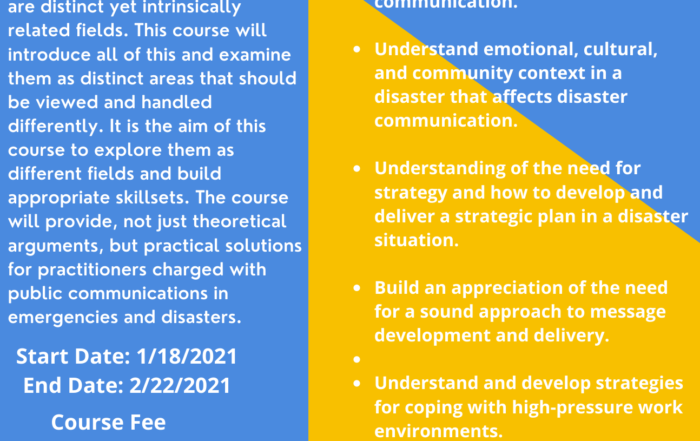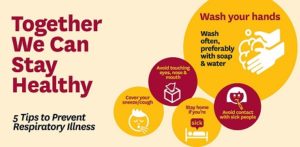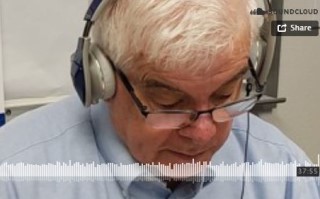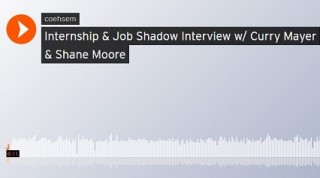Trio Group Creative Director Ricardo Ibarra interviews Bellevue City Emergency Manager Curry Mayer and Washington Military Department Catastrophic Planner Shane Moore on Internships and Job Shadowing in Washington State.
WATCH ON SOUNDCLOUDJOB SHADOWING AND INTERNSHIPS IN GOVERNMENT AND BUSINESS
Interview Transcript
Ricardo Ibarra (00:05):
Let’s dive into it. Curry, would you briefly describe what role the Homeland Security Emergency Management Center of Excellence plays for education and business in Washington?
Curry Mayer (00:16):
Sure, absolutely. So, the Center exists really to serve two main populations; one: our students who are interested in the fields of Homeland Security and Emergency Management and the other are employers throughout the state of Washington. Really, the benefit for both of those groups is knowing that they have a curriculum that has been tested. There are a number of options for students; they could get a- simply get a certificate or they could start with an AA degree and now there’s also a Bachelor of Applied Science so they can do any form of that that works best for them and for their schedule and for their interest areas. And then the business community knows that they have students coming from a system that has been tested, that the professors are all folks that have– are professionals in the field. They provide a lot of opportunities for internships and job shadowing. So all of those things are really important for those two groups.
Ricardo Ibarra (01:23):
That’s really great. Thank you so much. Shane, what was your college experience like and how did you decide to pursue job shadows and internship opportunities?
Shane Moore (01:34):
Well, I returned back to college after a long, long gap. Came back in my early thirties, after getting out of the army. I started off as a physics major actually, but I discovered that my passion didn’t exactly line up with my skills. So while I still loved physics, I decided to pursue something I would be a better fit for. And I came across the Homeland Security Emergency Management degree and it seemed to match my personality and my interests very well. So I started pursuing that. The degree program is a-a hybrid program where you take your core classes, you know, your English and your, your maths on college campus or you can do online classes if you want. But all of the emergency management classes are online. Being a father and still having to work and my wife who works full time–work full time at that point. It was a definitely a challenge going back to school with all of those other factors. So my, my college experience was, rocky at some points, trying to manage a full course loads with family. And then doing internships on top of that. What was the second part of your question?
Ricardo Ibarra (02:55):
How did you decide to pursue job shadows and internship opportunities?
Shane Moore (03:00):
So in our degree program, both for the associates and then the bachelor’s internships, are a required element. And in my opinion, that’s amazing that they are, other programs don’t have that requirement or they may not be as monitored as this internship program is. For example, you have coursework that you need to complete in addition to whatever work you do at your internship site. But you know, I did the required internships, but I also went beyond that. After I had some pretty successful experiences in my own internships, I recognized that I needed to continue in order to keep building a work experience in the field. They were, they were ultimately successful and they were very much what I made out of them. Ah, it’s pretty early the morning. My coffee hasn’t kicked in yet.
Ricardo Ibarra (04:00):
No problem. So you mentioned that your required internship/job shadow activities went really well, but you recognized the need for further education. Can you give me an example of something that like helped you realize, “Oh yeah, I really do need to keep doing this.”
Shane Moore (04:18):
So I did some informational interviews while I was still completing my bachelor’s and I was talking to the gentleman and I was- they had an open position at the time too, so I was also curious about that. And I inquired about that and he told me a story about some–one of his relatives that was trying to get into the field, and it took her four years after she had finished her degree. So I asked him and said, so what are my chances of getting to work here? And he said, “Well, first you have to absolutely have a Bachelor’s.” And I was still, you know, a year and a half away from that point. But, you also have to have the experience to set yourself apart from everybody else that’s applied. Emergency management can be a narrow field based on location. So I needed a way to put myself above, not only the graduates coming out of programs, but also existing professionals in the field maybe who are looking for a job change. So I saw internships as a way of building up that resume portion, which recently that came directly into play. While I had my current entry level job, I was applying for a higher level position. And for the first round, I didn’t make it through HR and HR people aren’t professionals in our field. They’re kind of separated in our organization, but it wasn’t until I went back and fully listed out all the stuff that I had done during my internships that I made it past HR in order to be considered by the subject matter experts. So, there’s some–definitely validity in my approach. Gain as much experience as you can. And luckily, you know, I–I recognized that which made my getting into the field quicker than others.
Ricardo Ibarra (06:10):
Great. Thank you. Curry, from your perspective as a COE board member and hiring manager, what’s the value of job shadows? Internships?
Curry Mayer (06:19):
Okay. So, I think that internships can really benefit any field. However, in Emergency Management and Homeland Security as Shane just mentioned that the experience piece is really critical. And that may sound like common sense, however, there have been a number of times where someone has gotten a degree in the field and then been thrown into a job where they’re in a super stressful situation and they can’t handle it. They have no idea that it’s really not like what they learned in school. And that theory is really different than having some actual experience. So, and I’ve been in the field long enough to have experienced that. You know, when I was in college there was no degree program in Homeland security and Emergency Management and you could not in fact get hired anywhere without some experience of some kind. And then you have that kind of catch 22, “Well, how do you do that if you, you know, if you– how do you get experience if you don’t have any?” And they need you to have experience ahead of time, but it really is about–the field is really so dynamic and so reliant on people being able to think on their feet and change course at a moment’s notice. Also being able to act with some authority without really having any legal authority and also getting people in other disciplines to help you do what you need to do when they don’t work for you. All of those things are– you can talk about them, but unless you have some actual experience, you’re probably not going to be very successful at doing that. So the internship provides the possibility of doing that. It also tells employers, as Shane mentioned, that not only have you had some practical experience, but you’ve made the effort to do something in the field prior to actually getting a job and Shane’s a really good example of how that made him more successful beca– well, for the reasons he described. And then also, I know Shane and he’s really intelligent and has crazy good skills and he’s good with people. And those are all things that are hard to describe in an interview or to show the employer that you have in fact the things that make you a good emergency manager. So the fact that he was able to do an internship, it also was a great networking opportunity. So all of those things are incredible benefits, not only for the student, but for the hiring manager who then gets know something about the person that they’re looking at for a real job after the internship is over.
Internships are invaluable and Shane as mentioned, really makes a difference when you’re hiring. And for me, if I were in a hiring situation and had a number of candidates, I would actually pick– if I had to pick between somebody with just education or just experience, I would pick the experienced person. The field is so– it’s so important for the field that you have somebody that’s had at least some type of experience. So just the education by itself is not as valuable. And the fact that the program supports internships and helps people find them and realizes that that’s a really big deal is really critical. And for anyone who knows about this field at all, any hiring manager knows that that’s the case. So they’re going to look for people that have some kind of internship or job shadowing experience.
Ricardo Ibarra (10:02):
Great. Thank you.
Shane Moore (10:03):
Hey, I want to circle back real quick to that first question. I remembered something. You asked what, you know, what did I get out of my internship? Curry reminded me of one of the most important elements is when you’re in these– in these classes, you’re getting a lot of knowledge, but the knowledge tends to come across many different subject areas without a whole lot of connection. And it’s not until you start doing internships that you see how all of these connections are made and how they all work together, which is not really something you can get from a textbook. I did–I did some observations through some exercises, emergency management exercises, as well as the internships really help paint that whole picture, for me, it’s kind of like a puzzle piece, I had a bunch of puzzle pieces and maybe I assembled some correctly. Maybe I really did not assemble some at all that should look like the picture, but through the process of doing all the internships, I really saw how that picture came together. So I was not only able to focus on what interests me most in emergency management, but I was also able to really talk about it during interviews and even in–for making resumes in looking at the job expectations I was able to really kind of interpret, read between the lines of what they were looking for and I wouldn’t have gotten that without doing internships.
Ricardo Ibarra (11:37):
Excellent. Thanks Shane. That was great. That was exactly my next question was to talk a little bit more about the benefits you received. So thanks for that. Curry, what are the best practices for creating an internship job shadow? What should an employer think about before, during, and after?
Curry Mayer (11:54):
Okay. So before you put together what you would like the intern to do. The employers should think about what are the kind of qualities that you’d like to see in a–in a person and be able to articulate what those are. And then for the actual internship, what are the jobs that you would like the person to work on and if you’re going to have them shadow–having them shadow things that are going to be beneficial for them to understand the field. For example, I am chair of the King County Critical Infrastructure work group. So if I were– if Shane was doing an internship with me, then I would want him to be involved in that committee work with me. So going to the meetings and then also talking about, you know, why that’s important, how critical infrastructure fits into emergency management. And then if there’s some work for the committee that would actually benefit him, you know, so not taking notes or something like that, but if we’re doing some kind of project with that committee that he could be a part of; that would give him some really good skills and idea of how that particular–how critical infrastructure fits into emergency management or Homeland Security. I think another piece of it for the employer is thinking about where are all the connections in that– in the role in your jobs. So me as the employer, where–what are all the connections I have with other departments or other agencies and how does that fit into emergency management? Cause that’s going to be a critical piece to help the person who’s in the internship understand all those connections. So thinking about what you want them to do and having a clear kind of outline and then path for what is it that you want them to work on prior to them getting there. During the internship, I think it’s important that you spend enough time with a person that they don’t feel like, they’re just like, “Well, I don’t really understand, like I’ve, maybe I’m working on this project”, but they need that connection as well. And even if you’re having do a specific project, I think spending time with the person and having them see where the connections are to other disciplines is going to be important. And then afterward, do you have something that, you know, a job that this person could fit in to and if not, helping through your network, connect the intern to other– other disciplines and other people that might be hiring.
Ricardo Ibarra (14:31):
Ooh, that last one was so good.
Curry Mayer (14:33):
Mhmm
Ricardo Ibarra (14:35):
Thank you. Yeah. I appreciate you throwing down the gauntlet. Like, really think about the intern after they leave your program.
Curry Mayer (14:42):
Yes. Well, and helping them before they leave. Here are some other people that you should talk to. I think what’s really interesting and also kind of a difficulty about this field and–and Shane could probably echo this, is that there’s so many jobs in–that are related that don’t have the title: Emergency Management or even Homeland Security. They may talk about “security” or “risk” or there’s just a whole bunch of other things. And so it’s hard sometimes to see where those connections are. If you’ve been in the field for a long time, then you can pretty easily make those connections. But also Shane talked about HR, you know, and them not understanding what’s connected. That’s such a– it’s almost a scary thing for me as a manager–hiring manager, because I always worry that, “Wow, there’s going to be somebody amazing who isn’t going to get through HR because they don’t know the words or they don’t understand how something that seems like it’s not connected might in fact be somebody who’s a really good candidate.” Kind of educating, what are those connections? How do we make sure the person understand– both the intern and then HR and whoever else, will listen. What are those other connections in different disciplines? Super important.
Ricardo Ibarra (16:03):
Great. Shane, what should educators and students do to prepare for a successful internship experience? And if you could speak to maybe common mistakes or some things that are, must do.
Shane Moore (16:17):
A lot of these things fit into both categories, really. Common mistakes and must do’s. You really should do your research into an organization. Even if somebody basically hands you an internship or arranges one for you, you really need to take the time to learn what they do as an organization and what they do in particular for the job field that you’re–you’re going into. So, my first internship was with Tacoma Public Utilities. Now, even though I was in my early thirties, I had never done an internship before. And I was– didn’t really know what to expect. Somebody had arranged the internship for me as I went and found the right people at the Center of Excellence, but I didn’t really know what–what to expect what I would be doing. And I–I didn’t take the time to do more than a cursory glance at the organization and what they did for emergency management. So doing your research is critical and that can be as simple as, you know, visiting their webpage, reading the about us section, and then following it up with even just an email to the person that you’re going to be working with and saying, “Okay I understand your organization does this. How does your role interact with your organization? What did they expect from you?” So you kind of– you get that picture painted and that starts the next process, which is developing a learning contract. So, all three parties should be engaged in this process, the educational institution, the student themselves and the employer so that you can set clear expectations; who, what you expect from the student, what they expect from the school and what the student expects from the employer. So, it definitely requires some work ahead of time. Hopefully this isn’t done, you know, on the– on their first day because you can then prepare yourself and maybe there’s a certain aspect of your field that you really want to explore, but you need to give the employer time to think of projects, talk to people to see how they can interact across different departments. And set the foundation for homework, cause some projects may take, you know, preparation time that you really need to do in advance the first day. Some common mistakes on both– well on the employer side is undervaluing the skills of an intern. It’s not a– not a babysitting job. These are adults with varying levels of knowledge in both the field that they’re in and knowledge from other fields that have cross connections. So, I know from talking with organizations, trying to set up internships; they feel like they– they don’t have time to basically babysit. Well you’re– you’re not babysitting, they’re– they’re an adult. And they really undervalue the work that they do; even the routine day to day work that they do. And that’s not saying making copies, but yeah, they really undervalue the work they do and how somebody who’s just getting into the field can benefit from those activities. Some– Some common mistakes that students make during the internship they can expect the employer to take the lead in their own education. That’s, well, no, it’s a two party deal where if you’re given an assignment and you complete it, you’re not just done. You’re there to learn, so follow it up, get up, get a new product, see what else you can assist. Even if you’re just going and giving– getting an interview from a-another person who works with emergency management in that organization that can again be really beneficial to understand how their emergency management in particular interacts with all the different stakeholders involved. A common mistake employers can make– Curry touched on this is not doing professional development for their internships in it. It’s not time consuming. Looking over somebody’s resume for two minutes can provide invaluable insight. For example, like going back to the HR discussion, there are certain keywords and buzzwords that if you’re going through an online HR submission process, it may screen and look for those keywords. And if you don’t know to include specific words, then you’ll never make passed the computer. And then once you do make it passed the computer is what you’re saying on a resume quality enough to even get an in-person interview, inter-basic interviewing skills that a professional in the field can help you with. You start talking about a subject and they stop you and they say, “No, no, no, talk more about that. That’s really important and undervalued in our field.” Or, “This is a particular area that you have experience in that others don’t really, so you need to stress this point more.” So that professional development is, it’s not very time consuming, but it’s incredibly important to the intern.
Ricardo Ibarra (21:50):
Fantastic. Well, thank you both so much for your time today. This is really insightful and I’m really excited to see the blog post that comes out of this.
Curry Mayer (22:00):
Yeah, well thank you, Ricardo. I think Shane and I are both big fans of the program and the Center of Excellence. He’s done really well. We’re super proud of him and he’s kind of our superstar. He’s the great poster child for– poster grownup. How about that? For the program? But, I’ve been in the field for a really long time and I’ve seen a lot of different types of educational opportunities and this one is really, really stellar, so we’re–we’re happy to talk about it, right, Shane?
Shane Moore (22:32):
Yes, definitely.
Ricardo Ibarra (22:33):
Excellent. Thank you again for your time. I hope you have a great rest of your day.
Curry Mayer (22:37):
Yeah, you’re welcome. You too.
Shane Moore (22:39):
All right. Have a great day.
Curry Mayer (22:40):
Bye Shane.
Shane Moore (22:41):
Bye Curry






